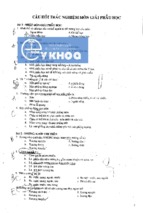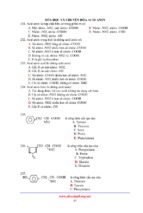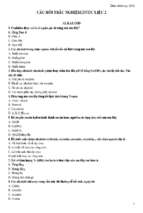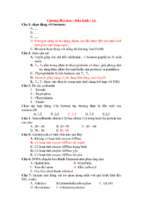Dr Tom Scott is the consultant anesthetist in charge of the Intensive Care Unit (ICU) at St
Hughes Hospital. Today is the first day in the Unit for two new Senior House
Officers(SHO), Dr Joan Crow and Dr John Baker. The three doctors are in the ICU where
Dr Scott is introducing them to their new working environment.
**********
Dr Scott: First of all Joan and John, I’d like to welcome you to the Intensive Care Unit. Have
either of you done much work on an ICU before?
Dr Crow: I haven’t. As a junior houseman, I used to come here very occasionally with the
consultant whom I was working with at the time.
Dr Baker: Nor have I. When I was a medical student, we had one tutorial in the ICU of the
hospital where I trained. And, of course, I’ve not actually worked at St Hughes before, so I’m
notfamiliar with the hospital at all.
Dr Scott: That’s no problem. The main reason I always have this session with new SHOs is
because very few have had any real exposure to an ICU and it can be quite daunting.
Dr Crow: You’re quite right. I certainly felt fairly anxious coming in here this morning. There’s
so much equipment around all of the patients.
Dr Baker: And they seem to have so many different problems.
Dr Scott: That’s true. Obviously that’s one of the reasons a patient is admitted to the ICU.
The most important thing is to keep calm and try to be logical in working through all of the
available information.
Dr Crow: How do you know where to begin?
Dr Scott: That’s a very reasonable question. You need to develop a framework that can
cover all patients and ensure that you consider everything that might be relevant. John, how
do you think you might start with a new patient in the Unit?
Dr Baker: I imagine the first thing to do is to review the patient’s history, although I suppose
the patient may not always be able to give you the information themselves.
Dr Scott: True, but it’s still very important to obtain it if at all possible because it can change
your management. For example, a patient with acute kidney failure may have a history
suggesting that this has occurred on a background of chronic renal problems.
Dr Crow: The family may be able to give some of the history, especially if the patient is too ill
or unconscious.
Dr Scott: It’s also important to get details of the events that led to the patient being admitted
here. Sometimes that will come from other medical or nursing staff. The patient may have
suffered severe trauma, perhaps after a car accident, or had some form of collapse. If so,
they may have been resuscitated or had a number of other things done and we need to have
the details.
Dr Baker: It’s clearly important to know what drugs, if any, have been given.
Dr Crow: And whether they’ve had blood or any other IV fluids.
Dr Scott: Absolutely. Once I’ve got all of this information, I assess the severity of the illness
from the end of the bed looking at both the patient and their charts.
Dr Baker: So you only actually examine the patient after that?
Dr Scott: That’s right. Unless of course there’s a major problem that needs immediate
attention. Joan, can you briefly summarize how you would proceed with your clinical
examination?
Dr Crow: Yes. In general, I suppose I would examine the patient in much the same order as I
would with a conscious, alert individual. I’d do the general things like assessing their color
and then I personally prefer to examine the legs and arms, followed by their abdomen, chest
and heart and finally examine their head, eyes… etc.
Dr Scott: That’s fine. It’s very important to assess the level of consciousness. Most ICUs
use a coma scale like the Glasgow scale and you’ll find a sheet summarizing it in
the ward office. Are there any things you need to be careful of, John, when you start
examining an unconscious patient?
Dr Baker: I’m not sure.
Dr Scott: Well, should you warn them before you start your examination?
Dr Baker: You mean so as not to frighten them?
Dr Scott: That’s right. It’s very important to explain to the patient before you do anything. And
to use the patient’s name. If the patient is only lightly unconscious, it can be very frightening
if you suddenly do something to them without warning. Even if the patient is deeply
unconscious, you must still remember to explain to them beforehand.
Dr Baker: I’d never really thought about that before. It’s important to keep in mind.
Dr Scott: After you’ve finished your examination,
I think it’s important to try and note down the information in a particular sequence so that
everything can be integrated.
Dr Crow: Do we put that on these special case notes?
Dr Scott: Yes, that’s right.
Dr Crow: So we start with general information on their conscious level, temperature, color,
and the presence of any injuries, edema or rashes.
Dr Scott: And then we go on to the CNS.
Dr Baker: It can’t be easy doing a full neurological assessment on ICU patients.
Dr Scott: No, a full examination is often impractical, especially in patients with multiple
injuries or with tubes everywhere. What are the particular areas of importance?
Dr Crow: The patient’s conscious level and their eyes, especially to see if the pupils react
and are of equal size.
Dr Scott: And an examination of the fundi is sometimes necessary. Anything else, John?
Dr Baker: It would be important to note any signs of CNS irritability such as fits, and also if
there are any lateralizing signs.
Dr Scott: Quite right. We also need to check brainstem function but I’ll talk to you about that
in more detail some other time. What about respiratory function, Joan?
Dr Crow: I guess that’s particularly important in ICU. Obviously we must check that the
breathing passage is clear, and we’ll also have to decide if they are going to need an
artificial airway or ventilating.
Dr Baker: We may need to check arterial blood gases.
Dr Scott: We very often will. Let’s move on and consider cardiovascular function because
this is an area where, although a thorough clinical examination is vital, we will usually take
more detailed hemodynamic measurements.
Dr Baker: Do you mean things like central venous pressure and pulmonary arterial and
wedge pressures?
Dr Scott: Yes, combined with ECG monitoring. Again that’s another area that we’ll cover in
more detail some other time.
Dr Crow: What other areas do we need to consider on this initial examination?
Dr Scott: Well, we should consider kidney function and the state of hydration and
also gut function.
Dr Baker: And I presume we have to think about checking for infection and carrying out all
the appropriate samples if they haven’t already been done.
Dr Scott: Certainly.
Dr Crow: Finally, I guess we have to put all of the information together and construct an
appropriate management plan, including any other investigations.
Dr Scott: That’s right, and also whether we need to get other specialist advice, for example
from the nephrologists in the case of renal problems or from the orthopedic surgeons in the
case of trauma patients. Well then, let’s get cracking.
Dr Crow: Ready when you are, Dr Scott.
Dr Scott: I think the best thing would be for the three of us to go and see some of the
patients and put some of what we’ve just been talking about into practice.
- Xem thêm -




















